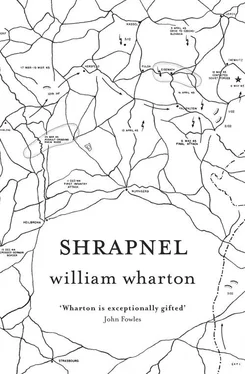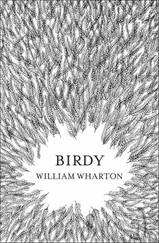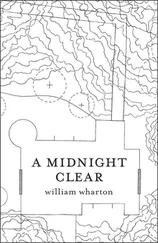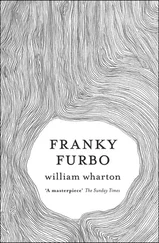Title Page
Prologue
1. Basic Training
Birnbaum
Williams
Corbeil
Logan
2. Fort Jackson, South Carolina
Sergeant Hunt
Water
3. Shipping Out
Doctor Smet
Need a Body Cry
D-3
4. Invasion
Sergeant Billy Dan Gray
Hide and Seek
The Galoshes Caper
Mike Hennessy
Capture
Franklin
Sergeant Ethridge
Crossfire
Court Martial
Champagne Party
5. Men at War
Russian Roulette
Rape Rap
Rolin Clairmont
A Flight of Fancy
Downhill Slide
The Great Jewel Robbery
6. Aftermath
Celebration
Flame Throwers
Massacre
7. Homecoming
Fort Dix, New Jersey
Glossary
Other Books by William Wharton
Copyright
About the Publisher
When we had little children, four of them, they always wanted me to tell them stories and I enjoyed the telling, but there were certain tales I never told. I’d developed the storytelling habit as a young boy, less than ten, making up scary stories for my younger sister.
Most of the tales I told to our children were about a fox named Franky Furbo. I told these stories from 1956, when our oldest daughter was four, until 1978 when our youngest was twelve. Mostly I told ‘get up’ stories in the morning while they were fresh and so was I, not bedtime stories.
We were lucky because, through most of my adult life, I did not leave home to work a job, and often, our children did not go to school. In a certain way, these stories were part of their schooling. Franky Furbo, among others, was a good teacher.
But sometimes our children wanted stories not about Franky Furbo but about other things, such as my childhood experiences, or fairy tales which ended with ‘and they lived happily ever after’. Our oldest daughter called these Ever After stories. Or occasionally, they wanted what they called ‘war stories’, tales about what happened to me during the course of World War II.
I generally didn’t want to tell those tales and tried to divert them, but children can be awfully persistent, so when I did tell tales about the war, they would be relatively amusing incidents, different ways of foraging for food, or evading various regulations, unimportant events of that nature.
In my book Birdy, in the penultimate chapter, I develop an important war experience, one of the types of tales I didn’t tell our children. The entire book A Midnight Clear revolves around another tale. I wrote A Midnight Clear because I thought we were about to re-establish the draft of young men, to send them off to kill or to be killed. I felt an obligation to tell something about war as I knew it, in all its absurdity.
One evening in New York I had dinner with Kurt Vonnegut. He asked me, ‘How was your war?’ I flippantly responded by recounting the number of court martials in which I’d been involved. It was not a good answer. War for me, though brief, had been a soul-shaking trauma. I was scared, miserable, and I lost confidence in human beings, especially myself. It was a very unhappy experience.
It was not a pleasant experience writing this book either. When dug up, the buried guilts of youth smell of dirty rags and old blood. There are many things that happened to me, and because of me, of which I am not proud, events impossible to defend now; callousness, cowardice, cupidity, deception. I did not tell these stories to my children. My ego wasn’t strong enough to handle it then, perhaps it isn’t even now, when I’m over seventy years old. We shall see.
I did write out many of these unacceptable experiences just after I came home when the war was over. I was fifty per cent disabled, and a newly enrolled student at UCLA. I cried too easily, made few friends, and couldn’t sleep. I’d stay up nights when I couldn’t sleep, trying to write the events, my feelings, my sense of loss, ineptitude. I had changed from an engineering major to an art major. I took a job as night watchman in a small notions store. I wanted to be a painter, but in the back of that store where I was night watchman, I was learning to be a writer and didn’t know it. Each dawn I’d read over what I’d written, tear it into pieces, and flush it.
There is written into Birdy one of the first really negative experiences I had in the military. It involved shovelling coal outside Harrisburg on a cold December morning. I hit a man with a shovel and was threatened with a summary court martial. Actually it was so summary, my only punishment was that I was confined to quarters until they shipped me out for infantry basic at Fort Benning, Georgia. It was the first in a series of my personal reactions to the constrictions and expectations of the military.
The conditioning of soldiers, so they will respond to command without question, was an abomination to me. Also, the rigid hierarchy on vested authority was an insult to my personal sense of identity, of value. I fought the military mentality with my meagre resources but to no avail. In the end they prevailed. They taught me to kill. They trained me to abandon my natural desire to live, survive, and to risk my life for reasons I often did not understand and sometimes did not accept.
1. BASIC TRAINING
Basic training in Fort Benning, Georgia, in 1944 was a minimum of twelve weeks. During this time we suffered through thirty mile long hikes, rifle range, infiltration courses, crawling under machine guns firing over us, all the nonsense and misery the army can think up.
There is a young man in our outfit called Birnbaum (his name means ‘a pear tree’.) He is Jewish and really wants to learn how to be a soldier so he can kill Germans. He’s more aware of the horror and racism of Hitler’s world than most of us.
Birnbaum is a great clod, a real klutz, a zaftig, a baby-faced fellow with two left hands and two left feet. It seems he can never do anything right, buttoning his clothes is a challenge for him. Even with help, he can barely make his bunk up to pass inspection. He isn’t a goof-off on purpose; he’s really trying to do what’s asked of him. It is absolutely pitiful. His inept concentration on the simplest of tasks could bring tears to your eyes. He just does things wrong somehow, no matter how much we all try to help him.
At each Saturday inspection, poor Birnbaum has something wrong, his webbing will be dirty or tangled, his entrenching tool dirty, his canteen or mess cup filthy, coated with sugar, stained brown by coffee, or something critical is missing from his full field pack. The military punishes not just the individual. Birnbaum is given additional KP or some messy job such as cleaning the latrines, and they cancel weekend passes into town for the whole squad or platoon.
On one general field inspection, our entire company has its weekend leave revoked. So, it isn’t out of pure altruism that we all try to help Birnbaum – we’re going stir crazy. The non-coms and officers in charge just can’t seem to accept the obvious fact that Birnbaum is never going to be their kind of soldier. We do everything we can, but the more we try, the worse he gets.
For daily rifle inspection, we have an absolutely vicious Lieutenant. He’s part of the regular training group, called the cadre, pronounced not as one syllable as in the original French. Lieutenant Perkins is from Tennessee, a former member of the Tennessee National Guard, and he really takes it out on poor Birnbaum.
Once, we do get Birnbaum through barracks inspection. We’ve already missed two weekend passes in a row so we all pitch in. We scrub his webbing clean, polish his shoes, make him practise his manual of arms until he’s perfect, at least as perfect at that kind of dumb thing as Birnbaum is ever going to be. All that’s left is rifle inspection out on the drill field.
Читать дальше












